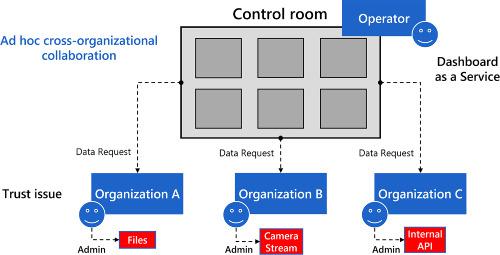当前位置:
X-MOL 学术
›
Int. J. Netw. Manag.
›
论文详情
Our official English website, www.x-mol.net, welcomes your feedback! (Note: you will need to create a separate account there.)
Trustful ad hoc cross‐organizational data exchanges based on the Hyperledger Fabric framework
International Journal of Network Management ( IF 1.5 ) Pub Date : 2020-08-24 , DOI: 10.1002/nem.2131 Laurens Van Hoye 1 , Tim Wauters 1 , Filip De Turck 1 , Bruno Volckaert 1
International Journal of Network Management ( IF 1.5 ) Pub Date : 2020-08-24 , DOI: 10.1002/nem.2131 Laurens Van Hoye 1 , Tim Wauters 1 , Filip De Turck 1 , Bruno Volckaert 1
Affiliation

|
Organizations share data in a cross‐organizational context when they have the goal to derive additional knowledge by aggregating different data sources. The collaborations considered in this article are short‐lived and ad hoc, that is, they should be set up in a few minutes at most (e.g., in emergency scenarios). The data sources are located in different domains and are not publicly accessible. When a collaboration is finished, it is however unclear which exchanges happened. This could lead to possible disputes when dishonest organizations are present. The receipt of requests/responses could be falsely denied or their content could be point of discussion. In order to prevent such disputes afterwards, a logging mechanism is needed which generates a replicated irrefutable proof of which exchanges have happened during a single collaboration. Distributed database solutions can be taken from third parties to store the generated logs, but it can be difficult to find a party which is trusted by all participating organizations. Permissioned blockchains provide a solution for this as each organization can act as a consensus participant. Although the consensus mechanism of the permissioned blockchain Hyperledger Fabric (versions 1.0–1.4) is not fully decentralized, which clashes with the fundamental principle of blockchain, the framework is used in this article as an enabler to set up a distributed database, and a proposal for a logging mechanism is presented which does not require the third party to be fully trusted. A proof of concept is implemented which can be used to experiment with different data exchange setups. It makes use of generic web APIs and behaves according to a Markov chain in order to create a fully automated data exchange scenario where the participants explore their APIs dynamically. The resulting mechanism allows a data‐delivering organization to detect missing logs and to take action, for example, (temporarily) suspend collaboration. Furthermore, each organization is incentivized to follow the steps of the logging mechanism as it may lose access to data of others, otherwise. The created proof of concept is scaled to 10 organizations, which autonomously exchange different data types for 10 min, and evaluation results are presented accordingly.
中文翻译:

基于Hyperledger Fabric框架的可信任的特设跨组织数据交换
当组织的目标是通过汇总不同的数据源来获取更多知识时,它们将在跨组织的环境中共享数据。本文中考虑的协作是短暂且临时的,也就是说,它们最多应在几分钟内建立起来(例如,在紧急情况下)。数据源位于不同的域中,并且不能公开访问。合作完成后,尚不清楚发生了哪些交流。如果存在不诚实的组织,这可能会导致纠纷。请求/响应的接收可能被错误地拒绝,或者它们的内容可能是讨论的重点。为了防止以后发生此类纠纷,需要一种日志记录机制,该机制可以生成重复的,无可辩驳的证据,证明在一次协作中发生了哪些交换。可以从第三方获取分布式数据库解决方案来存储生成的日志,但是要找到所有参与组织都信任的一方可能很困难。许可的区块链为此提供了解决方案,因为每个组织都可以充当共识参与者。尽管许可的区块链Hyperledger Fabric(版本1.0–1.4)的共识机制尚未完全分散,这与区块链的基本原理相冲突,但本文使用该框架作为建立分布式数据库的推动力,并提出了一项建议提出了一种不需要第三方完全信任的日志记录机制。实施了概念验证,可用于试验不同的数据交换设置。它利用通用的Web API并按照马尔可夫链进行操作,以创建一个全自动的数据交换方案,参与者可以动态浏览其API。由此产生的机制使数据传递组织可以检测到丢失的日志并采取措施,例如(临时)暂停协作。此外,激励每个组织遵循日志记录机制的步骤,因为它可能会失去对其他组织数据的访问权限。创建的概念证明将扩展到10个组织,这些组织将在10分钟内自动交换不同的数据类型,并相应地给出评估结果。由此产生的机制使数据传递组织可以检测到丢失的日志并采取措施,例如(临时)暂停协作。此外,激励每个组织遵循日志记录机制的步骤,因为它可能会失去对其他组织数据的访问权限。创建的概念证明将扩展到10个组织,这些组织将在10分钟内自动交换不同的数据类型,并相应地给出评估结果。由此产生的机制使数据传递组织可以检测到丢失的日志并采取措施,例如(临时)暂停协作。此外,激励每个组织遵循日志记录机制的步骤,因为它可能会失去对其他组织数据的访问权限。创建的概念证明将扩展到10个组织,这些组织将在10分钟内自动交换不同的数据类型,并相应地给出评估结果。
更新日期:2020-08-24
中文翻译:

基于Hyperledger Fabric框架的可信任的特设跨组织数据交换
当组织的目标是通过汇总不同的数据源来获取更多知识时,它们将在跨组织的环境中共享数据。本文中考虑的协作是短暂且临时的,也就是说,它们最多应在几分钟内建立起来(例如,在紧急情况下)。数据源位于不同的域中,并且不能公开访问。合作完成后,尚不清楚发生了哪些交流。如果存在不诚实的组织,这可能会导致纠纷。请求/响应的接收可能被错误地拒绝,或者它们的内容可能是讨论的重点。为了防止以后发生此类纠纷,需要一种日志记录机制,该机制可以生成重复的,无可辩驳的证据,证明在一次协作中发生了哪些交换。可以从第三方获取分布式数据库解决方案来存储生成的日志,但是要找到所有参与组织都信任的一方可能很困难。许可的区块链为此提供了解决方案,因为每个组织都可以充当共识参与者。尽管许可的区块链Hyperledger Fabric(版本1.0–1.4)的共识机制尚未完全分散,这与区块链的基本原理相冲突,但本文使用该框架作为建立分布式数据库的推动力,并提出了一项建议提出了一种不需要第三方完全信任的日志记录机制。实施了概念验证,可用于试验不同的数据交换设置。它利用通用的Web API并按照马尔可夫链进行操作,以创建一个全自动的数据交换方案,参与者可以动态浏览其API。由此产生的机制使数据传递组织可以检测到丢失的日志并采取措施,例如(临时)暂停协作。此外,激励每个组织遵循日志记录机制的步骤,因为它可能会失去对其他组织数据的访问权限。创建的概念证明将扩展到10个组织,这些组织将在10分钟内自动交换不同的数据类型,并相应地给出评估结果。由此产生的机制使数据传递组织可以检测到丢失的日志并采取措施,例如(临时)暂停协作。此外,激励每个组织遵循日志记录机制的步骤,因为它可能会失去对其他组织数据的访问权限。创建的概念证明将扩展到10个组织,这些组织将在10分钟内自动交换不同的数据类型,并相应地给出评估结果。由此产生的机制使数据传递组织可以检测到丢失的日志并采取措施,例如(临时)暂停协作。此外,激励每个组织遵循日志记录机制的步骤,因为它可能会失去对其他组织数据的访问权限。创建的概念证明将扩展到10个组织,这些组织将在10分钟内自动交换不同的数据类型,并相应地给出评估结果。


























 京公网安备 11010802027423号
京公网安备 11010802027423号